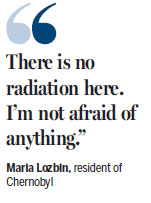Some people found life away from home so unbearable they decided to return, even when home was the site of the world's worst nuclear disaster.
Maria Lozbin was one of tens of thousands of people to be evacuated from their homes after the Chernobyl accident in April 1986, but returned with her family six years ago, to live off the land inside a 30 km exclusion zone where the risk of radiation poisoning remains.
A 69-year-old with a ready laugh and a green shawl wrapped round her, Lobzin said the village to which she had been evacuated was full of drunks and drug addicts.
The house into which she was moved was so shoddily constructed, with a huge crack running from the roof to the basement, that she was afraid of being killed or maimed by a falling object.
"Living there was like waiting for death," she said.
Now she lives with her son and his family back in Chernobyl, in a zone that can only be reached by crossing a checkpoint and where guides accompany curious tourists with radiation meters.
By contrast, a deathly silence hangs over the nearby abandoned town of Prypyat, where a rusting fairground wheel, and a kindergarten with toys, dolls and small beds are a grim testimony to the scale and speed of the disaster.
Lozbin keeps chickens, geese and ducks, grows potatoes and tomatoes, and goes foraging for mushrooms in nearby woods.
"There is no radiation here. I'm not afraid of anything," she said. "And when it's time for me to die, it won't happen because of radiation."
Tuesday marks the 30th anniversary of the Chernobyl disaster in then-Soviet Ukraine, caused by a botched safety test in the fourth reactor of the atomic plant that sent clouds of nuclear material across much of Europe.
The accident killed 31 right away and forced tens of thousands to flee. The final death toll of those killed by radiation-related illnesses such as cancer is subject to debate.
A Greenpeace report ahead of the anniversary cites a Belarusian study estimating the total cancer deaths from the disaster at 115,000, in contrast to the World Health Organization's estimate of 9,000.
The Greenpeace study also said people living in the area continue to eat and drink foods with dangerously high radiation levels.
In particular, "the 30 km exclusion zone around the Chernobyl reactor remains highly contaminated and unsuitable to live in", it said.

(China Daily 04/25/2016 page14)